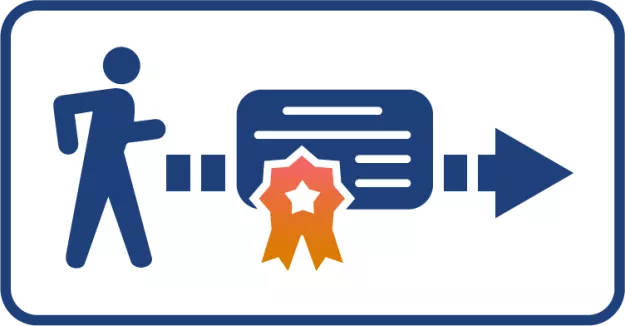

Learn to leverage technical expertise and project development skills to successfully implement renewable energy systems and sustainable business policies through the courses offered in this online degree program.
Execute and evaluate sustainability and renewable energy systems using baseline, techno-economic, life-cycle, energy efficiency, or cost-benefit analyses.
Evaluate sustainability decisions in the broader context of society's current and future interests.Use the principles of energy science, including resource availability, energy management, and conversion technologies in your day-to-day work.
Make sound decisions in complex situations. Understand the commercialization process relative to project and product development.Explore the knowledge and skills needed to become an RESS expert with strong project development and leadership skills. In addition, the program can prepare you to skillfully apply engineering principles to the business of energy in a variety of commercial and industrial occupations.
View Course ListAfter completing your 12 credits in core courses, you can make the most of your graduate program by tailoring your studies to include 12 credits in either the sustainability management and policy or the renewable energy systems track.
Areas specifically related to the following will be included:
Then, to meet your individual learning goals, you will select 6 additional credits from a broad list of electives. Finally, you will complete a 3-credit capstone experience in Management and Design of Renewable Energy and Sustainability Systems or partake in a special topics research opportunity with a faculty member.
The Master of Professional Studies (MPS) degree in RESS will be conferred upon students who complete a minimum of 33 credits while maintaining a grade-point average of 3.0 or better in all course work, including at least 18 credits at, or above, the 500 level (with at least 6 credits at the 500 level), and who complete the capstone experience requirement.
Examination of ethical issues relevant to research procedure, professional conduct, social and environmental impacts, and embedded values in research.
EME 504 Foundations in Sustainability Systems Theoretical background of sustainability issues and studies of sustainability systems. EME 801 Energy Markets, Policy, and RegulationStructure and function of energy markets; existing and emerging environmental regulations; decision-making by energy companies.
EME 802 Renewable and Sustainable Energy Systems An overview of renewable energy technologies and energy system analysis.Select 12 credits in either the Sustainability Management and Policy or Renewable Energy Systems track.
This course explores sustainability as a business opportunity for developing innovative products and services. It will focus on consumer needs related to sustainability, willingness to pay for these needs, and the innovative processes necessary to create sustainable solutions.
EME 803 Applied Energy PolicyProvides in-depth exploration of energy policy development, implementation, and assessment at multiple governmental and corporate scales, with emphasis on energy markets.
EME 805 Renewable Energy and Nonmarket EnterpriseIndustry perspective on the resources, technologies, engineering approaches, and externalities involved in deploying renewable energy businesses profitably and sustainably.
EME 807 Technologies for Sustainability SystemsThis course examines strategies and applications of sustainable technologies in manufacturing, energy, water, transportation, food, and building systems.
Theories and practices of solar electric systems, including component selection, performance simulation, grid interconnection, codes, and design documentation.
AE 878 Solar Project Development and FinanceEconomic analysis of solar energy projects, including project development process, energy policies, finance methods, and economic analysis tools.
AERSP 886 Engineering of Wind Project DevelopmentAn overview of the wind project development process and technical considerations for onshore and offshore applications.
EGEE 439 Alternative Fuels from Biomass SourcesExamine the chemistry of technologies of bio-based sources for power generation and transportation fuels.
EME 810 Solar Resource Assessment and EconomicsMethods, economic criteria, and meteorological background for assessing the solar resource with respect to solar energy conversion technologies.
EME 812 Utility Solar Power and ConcentrationTechnical and theoretical background for utility-scale solar energy conversion technologies to generate electric power.
PrerequisiteStudents may select two electives that focus on complementary disciplines such as Systems Engineering, Ecosystem Management, Community and Economic Development, Meteorology, and more. View the the most current list of elective courses, and contact the program office at [email protected] with any questions.
If you're ready to see when your courses will be offered, visit our public LionPATH course search (opens in new window) to start planning ahead.
Close Course List
This program can benefit you if you are already in the renewable energy and sustainability field and looking to advance in your current position or if you want to move into another segment of the rapidly evolving energy industry.
View Career InformationThe following roles are often held by people with this type of degree:
Estimates of employment growth and total employment are provided by the U.S. Bureau of Labor Statistics and are subject to change. While these occupations are often pursued by graduates with this degree, individual outcomes may vary depending on a variety of factors. Penn State World Campus cannot guarantee employment in a given occupation.

From the day you're accepted as a student, you can access resources and tools provided by Penn State World Campus Career Services to further your career. These resources are beneficial whether you're searching for a job or advancing in an established career.
Get the resources you need to make informed decisions about your education. Request information on this program and other programs of interest by completing this form.
Learn about this program's tuition, fees, scholarship opportunities, grants, payment options, and military benefits.
Tuition, Fees, and AidGraduate tuition is calculated based on the number of credits for which you register. Tuition is due shortly after each semester begins and rates are assessed every semester of enrollment.
| How many credits do you plan to take per semester? | Cost |
|---|---|
| 11 or fewer | $1,027 per credit |
| 12 or more | $12,325 per semester |
Some students may qualify for financial aid. Take the time to research financial aid, scholarships, and payment options as you prepare to apply. Military service members, veterans, and their spouses or dependents should explore these potential military education benefits and financial aid opportunities, as well. To view the detailed list of cost of attendance elements, select “World Campus” as the location on the tuition site.
Close Tuition, Fees, and Aid
Show mastery of specific subjects before your degree is complete. Thanks to shared courses across programs, students can often earn a certificate along with their degree in less time than if they earned them separately.
What You Can Earn While Completing This DegreeCredit toward the following graduate certificates can be earned while completing this degree program, if you apply and are accepted:
Solar Energy (Graduate Certificate)Focus on electric-driven study as you prepare to lead development in the rapidly expanding solar energy sector. This online certificate program includes courses that offer a foundation in project development, system design and analysis, and process improvement. Learn more about the Graduate Certificate in Solar Energy
Sustainability Management and Policy (Graduate Certificate)Learn to develop and improve manufacturing processes, corporate practices, and commercial products to promote long-term sustainability management with this online sustainability management and policy certificate program. Learn more about the Graduate Certificate in Sustainability Management and Policy
Close Additional Credential Information
Whether you are looking to finish your program as quickly as possible or balance your studies with your busy life, Penn State World Campus can help you achieve your education goals. Many students take one or two courses per semester.
How Quickly Can I Earn This Degree?Our online courses typically follow a 12- to 15-week semester cycle, and there are three semesters per year (spring, summer, and fall). If you plan to take a heavy course load, you should expect your course work to be your primary focus and discuss your schedule with your academic adviser.
Timelines may vary based on course availability.
Close Set Your Own PaceThis program's convenient online format gives you the flexibility you need to study around your busy schedule. You can skip the lengthy commute without sacrificing the quality of your education and prepare yourself for more rewarding career opportunities without leaving your home.


Penn State has a history of more than 100 years of distance education, and World Campus has been a leader in online learning for more than two decades. Our online learning environment offers the same quality education that our students experience on campus.

Apply by December 10 to start January 13
Application InstructionsComplete your application and submit all required materials by the appropriate deadline. Your deadline will depend on the semester you plan to start your courses.
For admission to the J. Jeffrey and Ann Marie Fox Graduate School, an applicant must hold either (1) a baccalaureate degree from a regionally accredited U.S. institution or (2) a tertiary (postsecondary) degree that is deemed comparable to a four-year bachelor's degree from a regionally accredited U.S. institution. This degree must be from an officially recognized degree-granting institution in the country in which it operates Penn State's online MPS-RESS program is suitable for individuals of diverse backgrounds and requires no prerequisite course work. However, for your admission to the program, it is preferred that you have a technical mindset and are interested in focusing on the implementation and interpretation of existing policies and regulations as they relate to renewable energy and sustainability.
Applications are submitted electronically and include a nonrefundable application fee. You will need to upload the following items as part of your application: Official transcripts from each institution attended, regardless of the number of credits or semesters completed. Transcripts not in English must be accompanied by a certified translation. If you are a Penn State alum, you do not need to request transcripts for credits earned at Penn State but must list Penn State as part of your academic history. English Proficiency — The language of instruction at Penn State is English. With some exceptions, international applicants must take and submit scores for the Test of English as a Foreign Language (TOEFL) or International English Language Testing System (IELTS). Minimum test scores and exceptions are found in the English Proficiency section on the Fox Graduate School's "Requirements for Graduate Admission" page. Visit the TOEFL website for testing information. Penn State's institutional code is 2660. GRE and GMAT test scores are NOT required. References (3) — You will need to initiate the process through the online application by entering names, email addresses, and mailing addresses of references. Upon submission of your application, an email will be sent to each recommender requesting they complete a brief online recommendation regarding your commitment for success in an online program. Please inform all recommenders they must submit the form in order for your application to be complete.
Vita or Résumé — Upload your résumé to the online application. Statement of Purpose — You should submit a personal statement not to exceed two single-spaced pages, which should describe your specific career goals and objectives, prior experience relevant to the decision to pursue an advanced degree, and other information that may be useful to the admissions committee.
To begin the online application, you will need a Penn State account. Create a New Penn State Account If you have any problems during this process, contact an admissions counselor at [email protected] . Please note: Former Penn State students may not need to complete the admissions application or create a new Penn State account. Please visit our Returning Students page for instructions.
Checking Your Status
You can check the status of your application by using the same login information established for the online application form.
Technical Requirements
Review the technical requirements for this degree program.